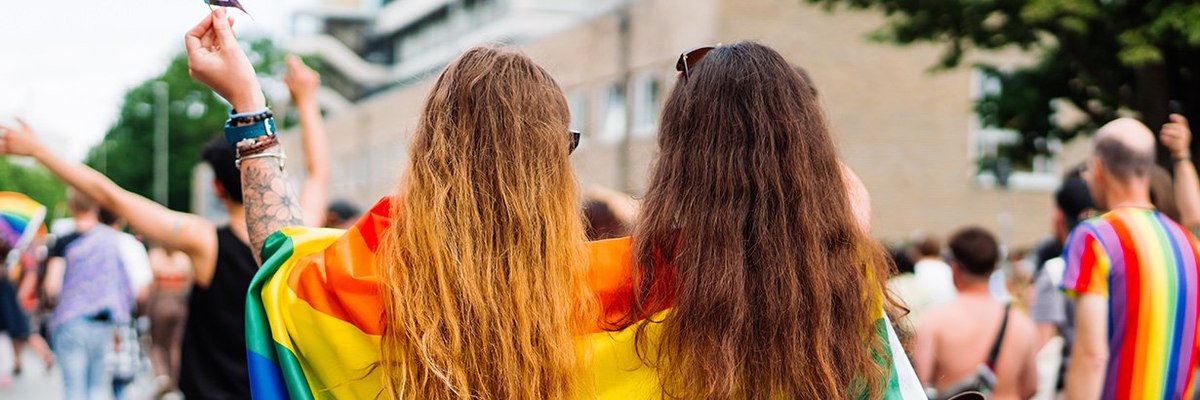Seeing the Pride flag displayed makes two thirds of queer Britons feel safer
Last month marked LGBTQ Pride Month, with rainbow flags being displayed and waved across the country.
Pride flags are an increasingly permanent display in many places, and new YouGov research shows that almost two in three LGBTQ+ Britons (63%) say that the Pride flag is important to them. Queer women are notably more likely to say so than queer men (70% vs 55%) and those with a different gender identity (e.g. nonbinary people) are more likely still to say so (77%).
The show of solidarity helps LGBTQ+ Britons feel more secure, with two thirds (67%) saying that seeing the Pride flag displayed in small public settings (like coffee shops, outside people’s houses, etc) makes them feel safer in that area. Women are again more likely to say so than men (75% vs 59%) as well as 79% of those with a different gender identity.
Lesbian and bisexual women have similar views on the Pride flag, although there is a more noticeable difference between bisexual and gay men, with the former noticeably less likely to see the flag as important (45% vs 56%) or to feel safer due to its presence (49% vs 61%).
Among transgender Britons, 72% say the flag is important to them, and an identical number say it makes them feel safer when displayed in small public settings.
This reassurance is important, as our research shows that queer Britons are often less likely to feel safe in public than their heterosexual counterparts (see next section).
This means LGBTQ+ Britons are less likely to take part in such innocuous daily activities as showing affection to their partner in public, with 71% of gay men and 66% of lesbian women saying they have held back from showing affection in public for fear of homophobic abuse.
This fear has proved to be well-founded for many, with around two thirds (66-69%) of gay men and lesbian women saying they have ever received homophobic discrimination while showing affection to a partner in public, with 44-50% saying that this has happened to them in the last five years.
As a result of such experiences, it is no surprise to see gay and lesbian Britons are substantially more likely to say they feel uncomfortable with making public displays of affection with their partner. This is especially the case among gay men, of whom 56% say they would feel uncomfortable holding hands in public and 63% say the same of kissing.
By contrast, only 9% of straight men and women are discomforted by the thought of holding hands with their partner while out and about, while 21-34% feel the same way about kissing.
Consequently, LGBTQ+ Britons are somewhat less likely to be affectionate in public with their partners – particularly queer men. Where only 7-11% of straight men and women say they never hug or hold hands in public, this figure stands at 8-14% for lesbian women, but 20% of gay men say they never hug and fully 40% say they never hold hands with their partner.
Likewise, while only 12-16% of straight men and women say they never kiss their partner in public, this rises to 19% among bisexual men, 21% among lesbian women, and 42% among gay men.
Lesbian women are notably less likely to say they feel safe when they and their partner are out in public
Our research also shows that queer Britons are less likely to say they feel safe in everyday scenarios than their straight counterparts, and that this is especially the case for lesbians.
While YouGov research has previously shown that women in general are less likely to feel safe in public settings than men, this distinction largely disappears in scenarios when they are with their partner. This is not the case for lesbian women, however, who across the board are notably less likely than other groups to say they “never” feel unsafe across our scenarios when with their partner. Only 36% of lesbian women say they never feel unsafe walking with their partner in the daytime, falling to 10% when walking together at night.
Our data likewise shows that transgender people are also less likely to say they feel safe in everyday situations than cisgender Britons. This is again more noticeably the case in scenarios when they are with a partner, with – for example – 35% of transgender people saying they “never” feel unsafe walking with a partner in the daytime, compared to 43% of cisgender LGB+ Britons and 63% of cisgender heterosexual Britons.
See the full results for LGBTQ+ Britons here
What do you think about the Pride flag, public attitudes towards LGBTQ+ people, and everything else? Have your say, join the YouGov panel, and get paid to share your thoughts. Sign up here.
Photo: Getty











